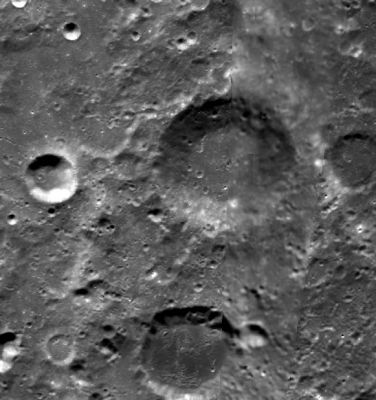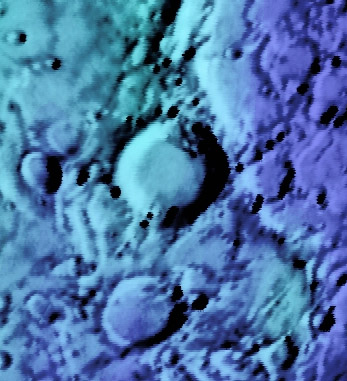Difference between revisions of "Cailleux"
| Line 15: | Line 15: | ||
''([[LAC%20zone|LAC zone]] 131C3)'' [http://planetarynames.wr.usgs.gov/images/Lunar/lac_131.pdf USGS Digital Atlas PDF]<br /> <br /> | ''([[LAC%20zone|LAC zone]] 131C3)'' [http://planetarynames.wr.usgs.gov/images/Lunar/lac_131.pdf USGS Digital Atlas PDF]<br /> <br /> | ||
==Description== | ==Description== | ||
| − | '''Cailleux''' lies within the [http://the-moon.us/wiki/South+Pole-Aitken+Basin South Pole Aitken Basin] (Diam., 2500 km) and just off the outer, south-western ring of the [http://the-moon.us/wiki/Poincar%C3%A9 Poincare Basin] (Diam., 319 km) -- both created during the [http://the-moon.us/wiki/Stratigraphy pre-Nectarian] period (~ 4.6 to 3.92 bn years). '''Cailleux''' is quite circular with a relatively worn rim all around -- impacted by several small impacts that, too, look worn. Needless to mention that the [http://the-moon.us/wiki/Schr%C3%B6dinger Schrodinger Basin] ([http://the-moon.us/wiki/Stratigraphy Imbrium] period) -- lying some 300 kilometres away to its south-west -- may be responsible for the old-looking appearance of the crater where ejecta deposits have landed in and around the crater. The interior of '''Cailleux''' shows a flat floor, but smaller impact craters within the region look fresher than those that lie around it -- perhaps, due to secondary events from the above-mentioned, younger basin.<span style="font-family: Arial"><span class="membersnap">- | + | '''Cailleux''' lies within the [http://the-moon.us/wiki/South+Pole-Aitken+Basin South Pole Aitken Basin] (Diam., 2500 km) and just off the outer, south-western ring of the [http://the-moon.us/wiki/Poincar%C3%A9 Poincare Basin] (Diam., 319 km) -- both created during the [http://the-moon.us/wiki/Stratigraphy pre-Nectarian] period (~ 4.6 to 3.92 bn years). '''Cailleux''' is quite circular with a relatively worn rim all around -- impacted by several small impacts that, too, look worn. Needless to mention that the [http://the-moon.us/wiki/Schr%C3%B6dinger Schrodinger Basin] ([http://the-moon.us/wiki/Stratigraphy Imbrium] period) -- lying some 300 kilometres away to its south-west -- may be responsible for the old-looking appearance of the crater where ejecta deposits have landed in and around the crater. The interior of '''Cailleux''' shows a flat floor, but smaller impact craters within the region look fresher than those that lie around it -- perhaps, due to secondary events from the above-mentioned, younger basin.<span style="font-family: Arial"><span class="membersnap">- JohnMoore2</span><br /> </span><br /> |
==Description: Wikipedia== | ==Description: Wikipedia== | ||
[http://en.wikipedia.org/wiki/Cailleux_(crater) Cailleux]<br /> <br /> | [http://en.wikipedia.org/wiki/Cailleux_(crater) Cailleux]<br /> <br /> | ||
Latest revision as of 20:04, 16 April 2018
Contents
Cailleux
(formerly Poincaré R)|| Lat: 60.8°S, Long: 153.3°E, Diam: 50 km, Depth: km, Rükl: (farside)
Images
LPOD Photo Gallery Lunar Orbiter Images
Maps
(LAC zone 131C3) USGS Digital Atlas PDF
Description
Cailleux lies within the South Pole Aitken Basin (Diam., 2500 km) and just off the outer, south-western ring of the Poincare Basin (Diam., 319 km) -- both created during the pre-Nectarian period (~ 4.6 to 3.92 bn years). Cailleux is quite circular with a relatively worn rim all around -- impacted by several small impacts that, too, look worn. Needless to mention that the Schrodinger Basin (Imbrium period) -- lying some 300 kilometres away to its south-west -- may be responsible for the old-looking appearance of the crater where ejecta deposits have landed in and around the crater. The interior of Cailleux shows a flat floor, but smaller impact craters within the region look fresher than those that lie around it -- perhaps, due to secondary events from the above-mentioned, younger basin.- JohnMoore2
Description: Wikipedia
Additional Information
Nomenclature
- Andre Cailleux (December 24, 1907 - December 27, 1986) was a French paleontologist and geologist. After earning his Ph.D. in 1942, he became a specialist in glacial and periglacial morphology. He worked as a professor of geology at the Sorbonne in Paris.
- This name was added to the IAU nomenclature in 1997 (IAU Transactions XXIIIB).
- The name Cailleux should not be confused with Cayeux of Dorsum Cayeux, which is a wrinkle ridge at the moon's Near Side!- DannyCaes Apr 26, 2009
LPOD Articles
Bibliography

